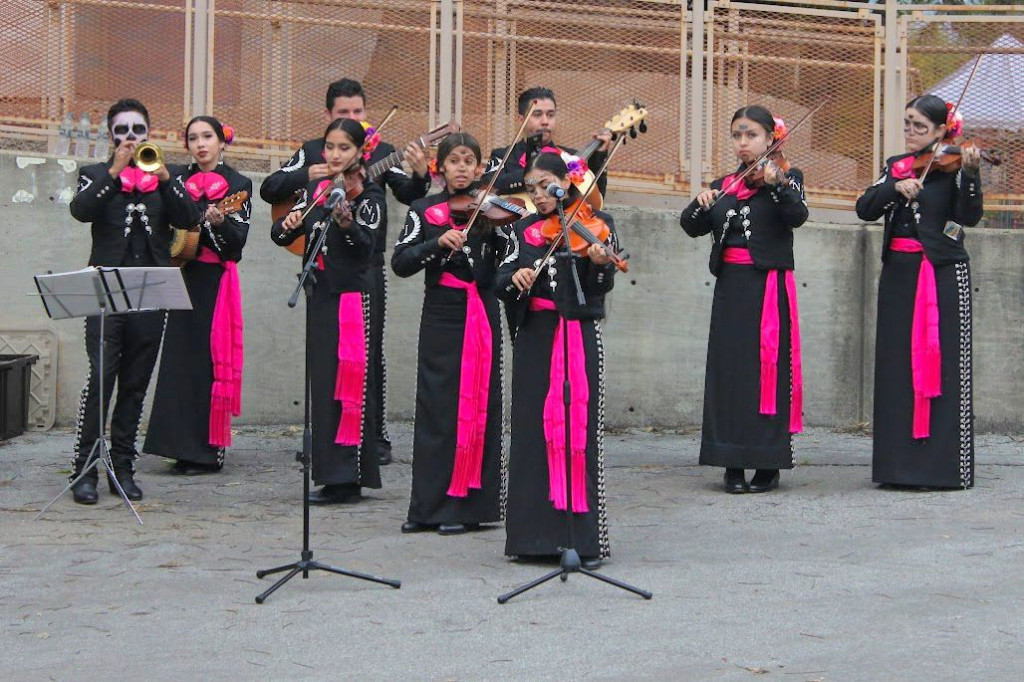The Bay Area Hispano Institute for Advancement (BAHIA) held an event for Día de los Muertos on October 30 at the Berkeley Adult School.
The event included a low riding car exhibit, stalls from many different Berkeley businesses, and food stands selling pan dulce, birria tacos, and aguas frescas. Inside, a group of dancers performed traditional dance in front of an intricate altar, and outside, a mariachi band played and sang in high harmony.

BAHIA has been in Berkeley since 1975 and has been putting on this event for the past eight years. For the last three, it has been sponsored by the City of Berkeley. BAHIA also has a preschool and after-school program for 2- to 10-years-old kids, so this event was geared towards families.
Last year, the event couldn’t happen due to COVID-19, but this year, BAHIA adjusted and partnered with organizations called RISE and Heart 2 Heart to put on the event. RISE is an academic support program for high schoolers, and Heart 2 Heart is a public health organization working with the City of Berkeley.
Before the pandemic, everything was done inside, but this year, only the dancers and altars were inside. Everything else was outside to protect against COVID-19.
Yesenia Chavez, the administrative coordinator for BAHIA, said it was largely thanks to the community that they could do this.
“We can’t do it without the community, so a lot of these organizations like the Berkeley Food Network, the City of Berkeley Dental and Vision, Heart 2 Heart, Lifelong, the Breath Mobile, the Bike Mobile … these are organizations that we are always working with that give free resources to the community,” she said.
Chavez wants younger generations to understand the importance of Día de los Muertos and to know that it is about honoring family and ancestors. She said although it is a celebration, it is not a holiday.
“A lot of people don’t know what Día de los Muertos is,” she said. “They just think ‘Hey, it’s a party, drinking, dancing, fun,’ and it’s not. It is a celebration, but at the same time, it’s remembering the ones that are no longer here.”
At the beginning of the event, Adriana Betti gave a speech in both Spanish and English. Betti is currently the executive director of RISE at Berkeley High School (BHS).
Inside, there was one main altar on the stage and smaller altars along the side. After the speech, everyone moved inside and the dancers performed in a half circle around a circle of marigolds, candles, and other traditional Día de los Muertos decorations.
Before each dance, Betti, who is the dance group’s teacher, explained what the dance was about and the significance it had. Betti said she created the dance group in 1993 after her brother was killed.
“I started this while I was a math teacher at [Martin Luther King, Jr. Middle School] in 1993,” Betti said. “That was when my brother was murdered and my mom said, ‘We need to make a space for our kids to be safe.’ And that’s when we started, to keep kids off the street.” From then on, they have been performing all around the Berkeley community.
The dancers agreed that the dance group was a great community and a place where they could learn about their heritage and dance without the fear of being judged.
“To be part of this group is therapeutic in a way,” said BHS senior Edrei Ugalde Montero. “You can come in here [and] no one will judge you. You just get to dance and move your body and you feel connected to everyone and the spirit that’s in the room.”
After the dancers performed, a mariachi band gathered outside dressed in mariachi attire with violins, guitars, a trumpet, and other instruments. Maza Cocina catered the event with a stand selling birria tacos. Birria tacos are from Jalisco, but have recently become more common in California.
Día de los Muertos is a sacred day full of tradition in which Latinx and Chicanx people honor their ancestors who have moved on to the next realm.
“That’s really what this event is about,” Chavez said. “ … That’s why we continue to do this event, to continue to show the generations what Día de los Muertos is actually about. It’s about honoring our families. It’s honoring our ancestors and we want to keep that going.”





